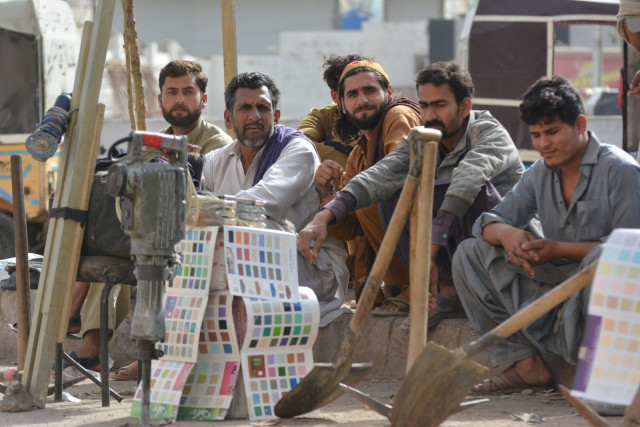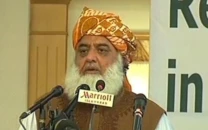City of lights offer little hope for migrants
High costs of living have forced non-native labourers to send wives, children back to their hometowns

Migrant labourers, battling loneliness in a strange land, waste no time in moving their loved ones with them to their new abode however, as exorbitantly high costs of living in the metropolitan center make survival exceedingly difficult, many non-native workers will have to bid farewell to their wives and children once again.
Karachi, the hub of economic activity, owes its multicultural nature to the vast array of migrant families, who move to the port city in search for greener pastures. Yet during the past one year, the continual recession has pushed a large population of migrant families out of the port city, as unaffordable rents, sky-rocketing utility bills and soaring food prices coupled with other routine family expenditures have made it nearly impossible for non-native labourers to ensure their family's survival in Karachi.
Amanullah, a migrant laborer from Pishin, who works at a local tea hotel, brought his wife and two children with him to Karachi, where he rented out a single room house in the Rais Amrohi Colony to accommodate his family.
"In our first year, the rent including electricity, gas and water costs, was fixed at Rs12,000 however, after one year, the owner increased the rent by Rs2000 and now he is demanding Rs3000 more. I cannot afford to pay Rs15,000 as rent, when my monthly earnings, Rs45,000 are barely enough to put food on the table for my family of three. Therefore, I have decided to send my family back to their hometown," shared Amanullah, who felt that most migrant labourers living with their families in Karachi were confronting a similar challenge.
Also read: Online salary transaction for labourers ordered
Saifullah, another migrant worker from Lala Musa, who works as a hairdresser in Karachi, lived with his family of eight at a rented place in Punjab Colony. "My brother and I run a barber's shop in Karachi. A few years ago, on the request of my mother, our whole family including my wife and children, shifted with us. Since electricity and gas are missing for several hours a day, we had to pay large amounts of money for an LPG cylinder, charging fan and battery in addition to the hefty gas bill, electricity bill, food costs and house rent. As a result, our monthly expenditure had touched Rs70,000 forcing me to send my wife and children back to the village," revealed Saifullah, who now lives with his brother in a one room house.
"Most migrant workers live in one room houses in Karachi, which are shared by five to seven workers. Dinner and breakfast are prepared together, while accommodation and food expenses are also divided," said Ahmad Nawaz, a migrant worker from Lodhran.
"One room houses, which include gas and electricity in their rent, are preferred by migrant workers. Today, the rent of a one room house in the suburbs is Rs12,000 and the rent of a two-room house is Rs15,000, while the same rent was Rs9,000 and Rs12,000 respectively last year," highlighted Azam Nawab, a property dealer.
According to Dr Kausar Parveen, Professor of Sociology at the University of Karachi, migrant labourers believe that finding employment in Karachi will naturally resolve all their economic woes. "Such false hopes encourage them to invite their families with them. However, there is a big difference between the environment and lifestyle of their native areas and Karachi, which makes it hard to adjust. Moreover, the costs of living in Karachi have increased by 50 to 70 per cent. The government must create employment opportunities in other areas too so that people can earn their livelihood without having to leave their hometowns," opined Dr Parveen.
"The government must offer social and economic security to migrant workers," urged Dr Abdul Jabbar Khan, an economist.
"The Chief Minister of Sindh is working towards creating more employment opportunities in Sindh in order to resolve people's economic woes," maintained Waqar Mehdi, representative of the Pakistan People's Party.



















COMMENTS
Comments are moderated and generally will be posted if they are on-topic and not abusive.
For more information, please see our Comments FAQ